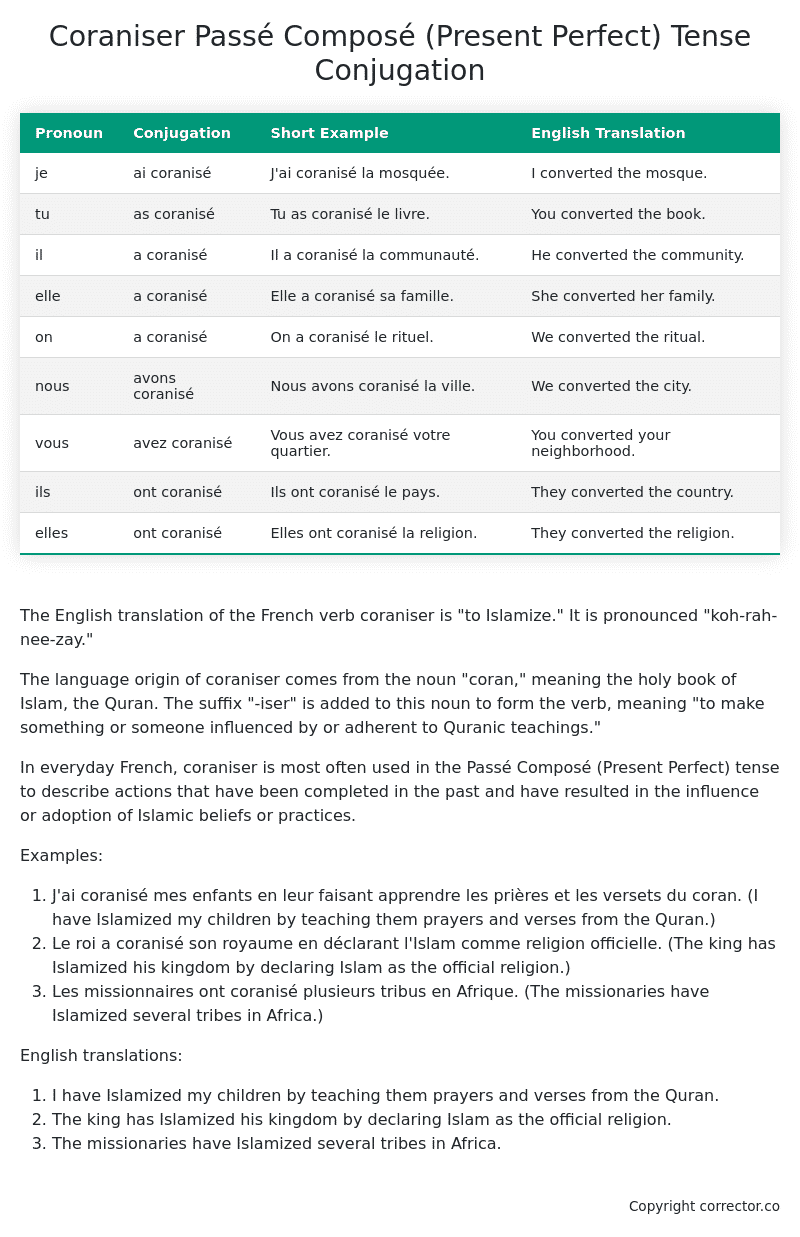Passé Composé (Present Perfect) Tense Conjugation of the French Verb coraniser
Introduction to the verb coraniser
The English translation of the French verb coraniser is “to Islamize.” It is pronounced “koh-rah-nee-zay.”
The language origin of coraniser comes from the noun “coran,” meaning the holy book of Islam, the Quran. The suffix “-iser” is added to this noun to form the verb, meaning “to make something or someone influenced by or adherent to Quranic teachings.”
In everyday French, coraniser is most often used in the Passé Composé (Present Perfect) tense to describe actions that have been completed in the past and have resulted in the influence or adoption of Islamic beliefs or practices.
Examples:
- J’ai coranisé mes enfants en leur faisant apprendre les prières et les versets du coran. (I have Islamized my children by teaching them prayers and verses from the Quran.)
- Le roi a coranisé son royaume en déclarant l’Islam comme religion officielle. (The king has Islamized his kingdom by declaring Islam as the official religion.)
- Les missionnaires ont coranisé plusieurs tribus en Afrique. (The missionaries have Islamized several tribes in Africa.)
English translations:
- I have Islamized my children by teaching them prayers and verses from the Quran.
- The king has Islamized his kingdom by declaring Islam as the official religion.
- The missionaries have Islamized several tribes in Africa.
Table of the Passé Composé (Present Perfect) Tense Conjugation of coraniser
| Pronoun | Conjugation | Short Example | English Translation |
|---|---|---|---|
| je | ai coranisé | J’ai coranisé la mosquée. | I converted the mosque. |
| tu | as coranisé | Tu as coranisé le livre. | You converted the book. |
| il | a coranisé | Il a coranisé la communauté. | He converted the community. |
| elle | a coranisé | Elle a coranisé sa famille. | She converted her family. |
| on | a coranisé | On a coranisé le rituel. | We converted the ritual. |
| nous | avons coranisé | Nous avons coranisé la ville. | We converted the city. |
| vous | avez coranisé | Vous avez coranisé votre quartier. | You converted your neighborhood. |
| ils | ont coranisé | Ils ont coranisé le pays. | They converted the country. |
| elles | ont coranisé | Elles ont coranisé la religion. | They converted the religion. |
Other Conjugations for Coraniser.
Le Present (Present Tense) Conjugation of the French Verb coraniser
Imparfait (Imperfect) Tense Conjugation of the French Verb coraniser
Passé Simple (Simple Past) Tense Conjugation of the French Verb coraniser
Passé Composé (Present Perfect) Tense Conjugation of the French Verb coraniser (this article)
Futur Simple (Simple Future) Tense Conjugation of the French Verb coraniser
Futur Proche (Near Future) Tense Conjugation of the French Verb coraniser
Plus-que-parfait (Pluperfect) Tense Conjugation of the French Verb coraniser
Passé Antérieur (Past Anterior) Tense Conjugation of the French Verb coraniser
Futur Antérieur (Future Anterior) Tense Conjugation of the French Verb coraniser
Subjonctif Présent (Subjunctive Present) Tense Conjugation of the French Verb coraniser
Subjonctif Passé (Subjunctive Past) Tense Conjugation of the French Verb coraniser
Subjonctif Imparfait (Subjunctive Imperfect) Tense Conjugation of the French Verb coraniser
Subjonctif Plus-que-parfait (Subjunctive Pluperfect) Tense Conjugation of the French Verb coraniser
Conditionnel Présent (Conditional Present) Tense Conjugation of the French Verb coraniser
Conditionnel Passé (Conditional Past) Tense Conjugation of the French Verb coraniser
L’impératif Présent (Imperative Present) Tense Conjugation of the French Verb coraniser
L’infinitif Présent (Infinitive Present) Tense Conjugation of the French Verb coraniser
Struggling with French verbs or the language in general? Why not use our free French Grammar Checker – no registration required!
Get a FREE Download Study Sheet of this Conjugation 🔥
Simply right click the image below, click “save image” and get your free reference for the coraniser present perfect tense conjugation!

Coraniser – About the French Passé Composé (Present Perfect) Tense
Formation of the Passé Composé
Set the auxiliary verb with either
Conjugate the auxiliary verb
Add the past participle
Common everyday usage patterns
Narrating Past Events
Sequential Actions
Describing Completed Actions
Interactions with other tenses
Imperfect Tense
Conditional and Future Tenses
Summary
I hope you enjoyed this article on the verb coraniser. Still in a learning mood? Check out another TOTALLY random French verb conjugation!


